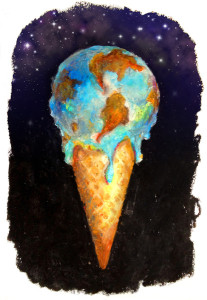Weather and climate continue to be a major news items — today it’s Storm Surge Watches for SW Florida off the approaching Tropical Storm Elsa, weather wise — and reports how a changing, warming climate is freaking out the weather.
Difference between weather and climate? Easy — according to the NOAA: ‘Think about it this way: Climate is what you expect, weather is what you get.‘
And what we’ve got is shit, from wetter, heavier storms, to drier, deeper droughts:
What a difference a year makes! Compare drought conditions in the United States and Puerto Rico in June 2020 to current drought conditions. https://t.co/P0zb9jhgfa #DroughtMonitor pic.twitter.com/xoQiXFd2M3
— NOAA NCEI Climate (@NOAANCEIclimate) July 2, 2021
Absolute number-one problem facing the US, the world, all of humanity, is climate change. There’s no real close second. Of course, a shitload of problems ‘appear‘ to stand in the way of doing more to keep the weather from shitting on us — in the US (and in many other countries with similar troubles), it’s the Republican/white nationalism fuck-up of just about everything, from democracy itself to racism in school curriculums to just general, violent-prone unrest.
And couple that shit with the most-likely endemic COVID-19 pandemic, and we be fucked. Only huge, wild-ranging natural disasters can bring a strong, united effort to tackle climate change, but from the reactions off the recent ‘mega-heat wave’ in the American West and Canada, beyond the horrid stories, was more other stories on everyday living. Mass shootings is super markets take a higher attention toll.
In the intense blast of daily issues, the near-subtle, slower-than-a-news-cycle onslaught of climate change doesn’t stand a chance and is pushed aside if you’re not personally effected.
Soon just about everyone will be touched by it, but most-likely it will be way-too late.
A real horror of this climate ‘crisis,’ like a lot of other shit, it didn’t have to end up this way. What got me thinking/working on this post was a piece in the Guardian this morning about the sad, long history of climate change, and how obvious, red-flag warnings over more than 60 years were ignored, or worse, kept hidden.
An edited extract from “Our Biggest Experiment: An Epic History of the Climate Crisis,” by Alice Bell, paints a terrible timeline starting back in the 1960s pointing to a major shift in our planet’s climate due to the burning of fossil fuels. Bell is also co-director at the climate change charity, Possible.
The two opening graphs set the stage:
In August 1974, the CIA produced a study on “climatological research as it pertains to intelligence problems.”
The diagnosis was dramatic. It warned of the emergence of a new era of weird weather, leading to political unrest and mass migration (which, in turn, would cause more unrest).
The new era the agency imagined wasn’t necessarily one of hotter temperatures; the CIA had heard from scientists warning of global cooling as well as warming. But the direction in which the thermometer was travelling wasn’t their immediate concern; it was the political impact.
They knew that the so-called “little ice age,” a series of cold snaps between, roughly, 1350 and 1850, had brought not only drought and famine, but also war — and so could these new climatic changes.“The climate change began in 1960,” the report’s first page informs us, “but no one, including the climatologists, recognised it.” Crop failures in the Soviet Union and India in the early 1960s had been attributed to standard unlucky weather.
The US shipped grain to India and the Soviets killed off livestock to eat, “and premier Nikita Khrushchev was quietly deposed.”
Although a pretty-long read for an online piece, it’s well worth the time. Bell carves a fascinating, but disheartening plot from the 1970s, where even with the knowledge of CO2 damage, the problem more of a ‘domestic oil crisis’ than any overall climate difficulty, through the oil companies research on the reality of climate change in the 1980s, and then their shift to full-blown efforts to camouflage the problem and deny the danger, to the complicated, contradictory calamity we face today.
Bell sums it:
As citizens of the 21st century, we have inherited an almighty mess, but we have also inherited a lot of tools that could help us and others survive. A star among these tools — sparkling alongside solar panels, heat pumps, policy systems and activist groups — is modern climate science.
It really wasn’t all that long ago that our ancestors simply looked at air and thought it was just that — thin air — rather than an array of different chemicals; chemicals that you breathe in or out, that you might set fire to or could get high on, or that might, over several centuries of burning fossil fuels, have a warming effect on the Earth.When climate fear starts to grip, it is worth remembering that we have knowledge that offers us a chance to act.
We could, all too easily, be sitting around thinking: “The weather’s a bit weird today. Again.”
Optimism and hope are good, but reality is the key.
Fiction vs fact:
Panic room…
 (Illustration out front found here).
(Illustration out front found here).